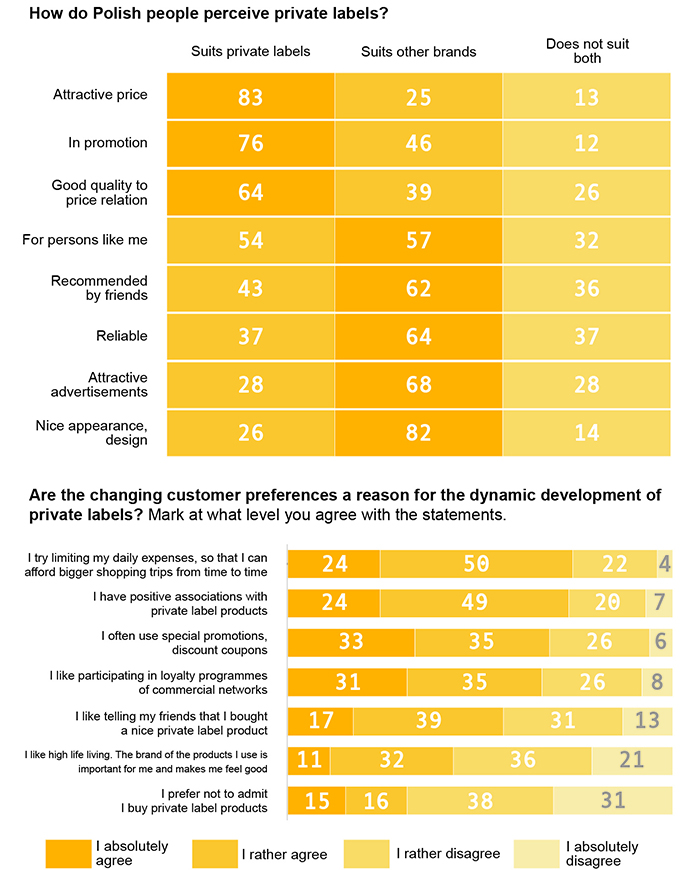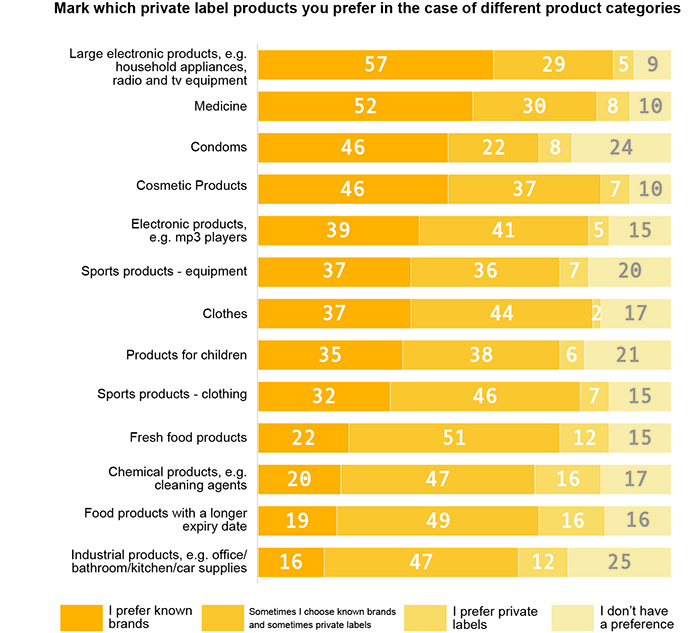APPRECIATED...
Private labels have a significant position in Polish households. Up to 97% of customers declare that they have private label products at home. Concurrently, up to 71% of Polish people have a positive association with them. An essential quality of private label products is their lower price – than in the case of the so called producer labels – and the fact that promotional offers of retail networks are often connected to them. In times where a decisive majority (85%) of Polish people look for solutions to save money, without losing the quality of everyday life, these are very significant aspects. The customer who chooses private label products is a smart customer who relatively often (56%) likes to show his nice purchase off to his friends. The private label is simply “for such people like me” – 54% of customers agree with this statement (in the case of producer labels, this number is only slightly higher and is 57%).
... OR UNAPPRECIATED?
However, there is also the other side of this coin. Private labels, to a significantly lower extent than producer labels, are associated by the customers with good quality, (45% as compared to 70%) or reliability (37% vs. 64%). According to Poles , they take care of their image much less and have significantly less attractive advertisements. This explains the fact that up to 30% of purchasers of private label products prefer not to admit it.
PRIVATE LABELS TODAY
To summarise: for a Polish customer, private labels in 2014 were generally interesting products, adjusted to his needs and at an attractive price, but not the best in terms of quality and without the best image. This sets a challenge before the retail networks - how to speak (and whether to speak at all) about the quality of private labels in order to enhance their image.
GOOD QUALITY OR (ONLY) QUALITY AT A GOOD PRICE?
The fact that private label products are often a cheaper alternative for “luxurious products” does not mean that their quality is low. Suppliers cooperating with retail networks must meet strict standards. The products undergo tests before being introduced to trade – not only tests dictated by the Polish legal standards, but also additional tests, developed by the retailer networks. This, however, is not a well-known fact. Therefore, is it worth communicating this in a broader scope that the private label is objectively “good” and not only “good at the price it is offered at”?
Here we encounter a considerable issue – safety. A high quality product is a safe product. Therefore, if the customers indicate that saving at the cost of safety is unacceptable for the purchase of products from a given category, then the quality of private labels must be spoken of loudly.This is especially important in the case of products for children or fresh food products as well as, among other things, for care cosmetic products. Development of an effective and not necessarily expensive communication programme based on the proof of quality is worth considering. One can show “how it is done” (the route from obtaining the raw material, through the production process, to the shop shelves), present the opinions of independent experts, perform and publicise customer opinion research regarding products. Obviously, there is no single ideal way, each programme must be tailored to the label it regards and based on data we can use.
QUALITY BEFORE DESIGN
There is also one more important conclusion. The factor inhibiting the active communication of private labels may be the fact that, quite often, they are not as good looking as the designer producer labels. One must, however, remember that it is not appearance and packaging that is decisive in terms of final purchase. Depending on the category, for the customer the significance of the broadly understood aesthetics of the product is lower by several up to several dozen percentage points than the significance of quality. Since private labels are backed by quality and this quality is communicated, they have nothing to be ashamed of.


*About the report
The report entitled “How we perceive private labels – private label development perspectives in Poland”, published in 2014, was prepared by On Board PR Ecco Network based on public opinion research conducted by SW Research on the randomly selected representative samples of adult residents of Poland. The research was conducted by means of Internet standardised questionnaire interviews (CAWI). The research sample was purposive. The persons invited for the research were 18 to 68 years old. There were 1009 completed questionnaires collected in total. The maximal standard error did not exceed 3.2 percentage point for the entire examined sample. The research was conducted in proprietary software “3S”, integrated with the Internet panel – SW Panel (swpanel.pl).
The report is available on: www.onboard.pl












